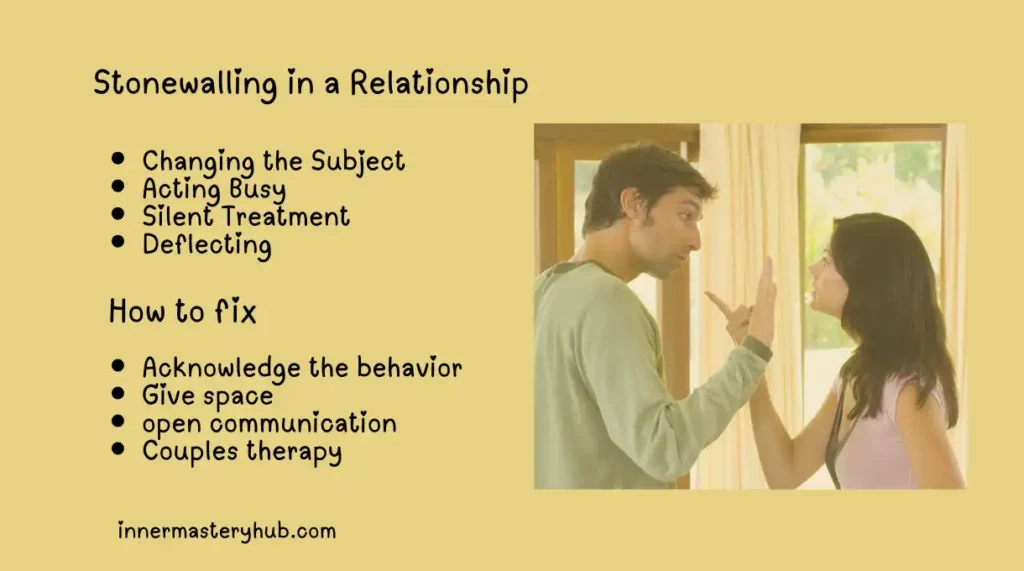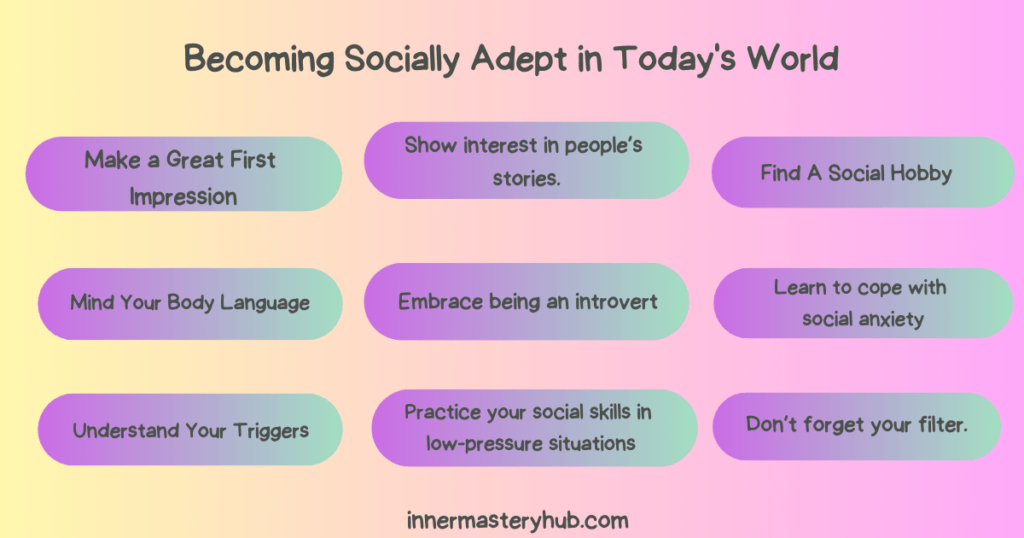Examples of Stonewalling in a Relationship and How It Destroys Communication

Stonewalling has become common in relationship discussions, although it’s challenging to define. Stonewalling occurs when one spouse refuses to communicate, often in response to unsettling or stressful circumstances. When you feel ignored, shut down, or emotionally neglected in a relationship, you may be facing stonewalling. This article explains stonewalling, its types, its impact on relationships, and what to do if you encounter it.
Examples of Stonewalling in a Relationship
Stonewalling can silently harm relationships. It occurs when one person emotionally withdraws from a conversation or situation, thereby limiting interaction. They may avoid the matter, ignore the other person, or shift the subject of discussion. The other partner feels ignored and frustrated.
Partnerships require both emotional connection and interaction. Someone is stonewalling you when they avoid communicating openly and fail to resolve disputes. Stonewalled people feel isolated and split up as the withdrawal continues.
How Does Stonewalling Affect a Relationship?
Examples of Stonewalling are continuous mental distress and frustration. Imagine having a fight with your partner who shuts down totally. No matter how much you interact, they change the subject or act busy to avoid communication. This delays the conflict and hampers an agreement.
Stonewalling can make the partner feel unimportant and irrelevant over time. The Gottman Institute found that stonewalling is one of the worst relationship practices. It can cause emotional neglect, trust issues, and anxiety. As stonewalling continues, partners grow aloof, and it becomes harder to reconnect emotionally.
Examples of Stonewalling in a Relationship
Examples of Stonewalling in a Relationship can manifest in several ways, and recognising it is the first step to addressing it. Here are some examples;
Changing the Subject. The stonewalling spouse avoids or deflects key topics. This hampers resolution.
Acting occupied. The stonewaller may pretend to be working, doing chores, or otherwise occupied to avoid discussing the matter. They may ignore emotional themes by watching TV or using their phone.
Deflecting. Stonewallers may blame others or point to prior mistakes when addressed. This lets them avoid discussing the matter.
Silent Treatment. One partner may refuse to discuss a problem and not talk, which is one of the most commonly used examples of stonewalling in a Relationship.
Two Types of Stonewalling in a Relationship
Stonewalling isn’t a one-size-fits-all behaviour. Two main types of stonewalling in a relationship:
- Active Stonewalling. This is when someone intentionally avoids communication. They may ignore their partner’s attempts to engage or end the conversation by leaving.
- Passive Stonewalling. A passive stonewalling spouse may appear physically present but emotionally disengages. They may nod or respond briefly but avoid a profound connection. This type is more difficult to identify because it generates emotional isolation without physical disengagement.
Reasons a Person May Stonewall

Stonewalling generally results from anxiety, fear, or insecurity. Several reasons are examples of Stonewalling in a Relationship:
- Emotional Overload. When overwhelmed by emotions, people may withdraw since they can’t express themselves.
- Avoidance of Conflict. Some people avoid uncomfortable topics by stonewalling. They may think avoiding the topic will settle things temporarily.
- Fear of Judgment or Criticism. Someone may stonewall because they fear criticism, judgment, or rejection.
- Power and Control. Stonewalling can be used to manipulate relationships and avoid conflict.
Effective problem-solving requires understanding why someone might stonewall. Stonewalling hurts the connection regardless of the reason.
What to Do When Someone is Stonewalling You
If you’re on the receiving end of stonewalling, it can be so frustrating and hurtful. Here are some tips on how to handle the situation;
Keep it peaceful. Don’t let your emotions get the best of you; instead, use them to your advantage. Use a long breathing exercise, and if your partner needs it, give them some space.
Accept the Behaviour. The point out the behaviour in a quiet manner. By way of example, “I saw that you aren’t responding to me right now, and I feel like I’m not being heard.”
Provide Them Space. People often stonewall when they feel overwhelmed. Allow them some time to calm down, but make plans to talk again at a later time.
Get Advice. If stonewalling occurs frequently in your relationship, it may be beneficial to consult a therapist. Therapy can help both individuals in a relationship understand what triggers their reactions and communicate more effectively with each other.
What Can We Learn from Stonewalling?
Stonewalling is damaging, yet it teaches us about interpersonal interactions. Successful communication involves active engagement. Having unpleasant conversations delays problems, not solves them. Stonewalling additionally highlights the need to consider your partner’s emotional needs and resolve conflict.
What’s the Antidote to Stonewalling?
Honest communication can overcome stonewalling. Take some time off and work on self-regulation when emotions are intense. Both couples should commit to open and sincere communication, avoiding emotional withdrawal. Paying attention, taking breaks, and scheduling challenging conversations can help prevent relationship stonewalling.
What Does It Feel like when Someone is Stonewalling You?
Stonewalling can seem like emotional desertion. You may feel ignored, frustrated, and detached from your relationship. When someone you care about won’t talk, you may feel helpless. If the behaviour continues, this might lower your self-esteem and cause emotional pain.
Relationship Impacts when Someone is Stonewalling You
Stonewalling can seriously damage a relationship. Communication gaps can cause emotional distance, isolation, and neglect. Partners may feel like they’re no longer together, which can lead to resentment, irritation, and trust issues. Unresolved stonewalling can lead to a breakup or long-term relationship discontent.
Conclusion
Stonewalling may harm relationships and cause lasting emotional wounds. Rebuilding a healthy, communicative connection involves noticing the behaviour, understanding its underlying causes, and addressing it. However, with stonewalling, a more connected and respectful connection can be achieved over time, with effort, mutual understanding, and dedication.
Frequently Asked Questions (FAQs) about Someone Stonewalling You
What is an example of stonewalling in a relationship?
Stonewalling, which can result in unresolved problems and dissatisfaction, occurs when one spouse emotionally distances themselves from the other and refuses to engage in conversation.
Why do people stonewall?
Emotional exhaustion, a fear of disagreement, a desire for control in the relationship, or other factors can cause someone to stonewall.
How can I tell if my partner is stonewalling?
Silence, avoiding eye contact, shifting the topic, or leaving a conversation are all examples of stonewalling in a relationship.
Can stonewalling be harmful?
In a relationship, stonewalling can indeed impede communication, cause emotional distance, and result in feelings of neglect, loneliness, and frustration.
What should you do when someone is stonewalling you?
Remain composed, allow them room, and deal with the conduct at a later time. Refrain from making things worse, and if necessary, seek expert assistance.
Is stonewalling the same as the silent treatment?
Although both require quiet, stonewalling is a strategy to avoid emotional interaction, whereas the silent treatment is frequently employed as a kind of punishment.
What is the antidote to stonewalling?
Honest, open communication is the remedy. Addressing the root causes and avoiding emotional disengagement are made easier by actively and sympathetically participating.
What is the impact when someone is stonewalling you in a relationship?
Frustration, misunderstandings, and emotional neglect result from stonewalling. It has the potential to weaken intimacy and trust between spouses over time.
How do I stop stonewalling?
Develop your self-awareness, identify your emotional triggers, and engage in active listening. Take pauses when necessary, but return to the discussion to address the problem.
What can I learn when Someone is Stonewalling You?
The value of constructive communication is often undermined by stonewalling. Avoiding difficulties makes them worse and causes partnerships to become emotionally distant.






